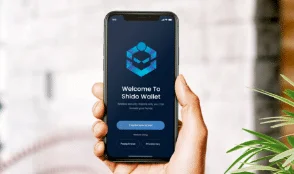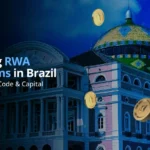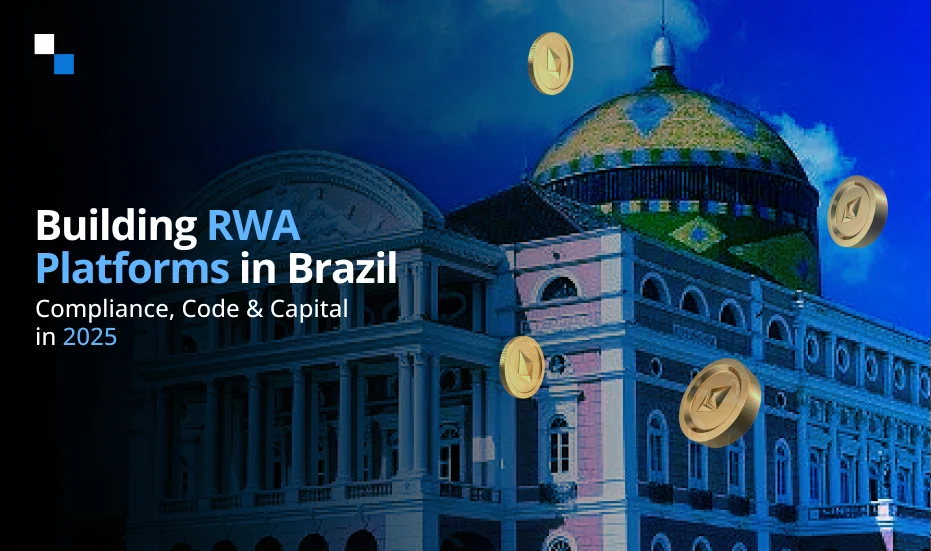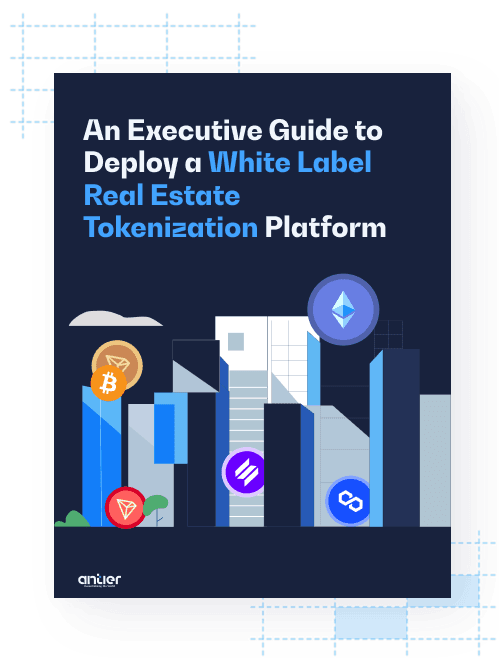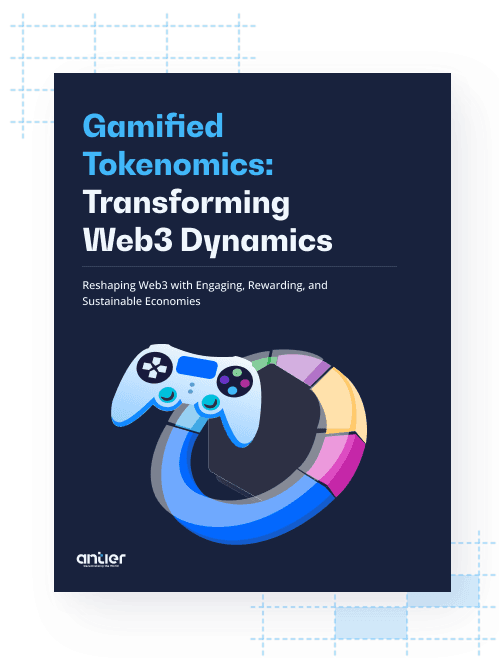Brazil has emerged as one of the world’s most advanced ecosystems for Real-World Asset Tokenization. The country is demonstrating how blockchain technology, compliance infrastructure, and financial innovation can converge to reshape capital markets. For platform developers, fintech architects, and tech teams, Brazil offers a production-ready proving ground. This guide explores how to launch the Brazil Asset Tokenization Platform.
Regulatory Upgrades: Transforming RWA Tokenization in Brazil
Brazil’s regulatory requirement is unlocking real-world asset tokenization. The Central Bank of Brazil and CVM are facilitating a compliance-first ecosystem that allows platform developers to experiment, iterate, and deploy within guardrails. Their proactive stance is drawing global attention from fintech and real-world asset tokenization platform development companies.
Regulatory sandboxes customized for Asset Tokenization in Brazil
These sandboxes provide a risk-contained environment for platform builders to pilot tokenized financial products, test smart contract automation, and assess regulatory fit without facing full enforcement consequences. It’s a safe zone to pressure-test tech and compliance logic before scaling.
- Licensing frameworks around custody, compliance, and securities
Clear licensing guidance means Brazil Asset Tokenization Platform can obtain digital asset custody approvals, build investor protection layers, and meet securities registration standards. For developers, this translates into a predictable, modular compliance architecture.
- Digital identity infrastructure integration
The government’s digital ID initiatives enable real-time KYC/AML integration into blockchain platforms. This allows RWA Tokenization Brazil projects to automate identity verification at the protocol level, reducing onboarding friction while maintaining legal compliance.

Brazil Asset Tokenization Platform Development Impact
- KYC/AML automation must be native, not bolted on
Compliance logic cannot live in a spreadsheet. Platforms must integrate digital ID systems and biometrics natively into onboarding flows, backed by real-time checks that fulfill regulatory scrutiny without requiring manual reviews.
- Compliance logic belongs in smart contracts
Rules around asset transferability, investor limits, and tax calculations must be enforced directly by the smart contract layer. This eliminates human error, builds trust, and ensures audit-readiness.
- Middleware needs a legal audit trail sync between off-chain and on-chain environments
Every transaction event, whether triggered on-chain or initiated by fiat back-office systems, must sync seamlessly into a unified audit trail. This is essential for regulatory filings and dispute resolution.
VERT Case Study: Institutional-Grade RWA Tokenization Brazil Execution
VERT Capital’s Brazil Asset Tokenization Platform is the flagship example of institutional tokenization done right. They digitized $130 million in Agribusiness Receivables Certificates on blockchain, proving that Brazil’s tokenization wave has moved far beyond MVPs into real asset transformation.
- Asset tokenization isn’t limited to equity; it covers debt instruments, too
CRAs represent future cash flows owed by agribusiness firms. Tokenizing them introduces transparency, liquidity, and investor confidence to debt-based assets, a breakthrough for Brazil’s credit markets.
- Tokenized cash flows can support programmable compliance and fractional ownership
With smart contracts governing how, when, and to whom cash flows are distributed, platforms can automate interest payments and enable micro-investments, opening access to previously illiquid asset classes.
- Real-world integrations with regulated markets are feasible and operational
VERT’s deployment integrates directly with Brazil’s traditional financial infrastructure, demonstrating that blockchain doesn’t need to replace the system; it can enhance it through API-driven coexistence.
Real World Asset Tokenization Platform Development: Technical Guide
Building compliant, scalable real-world asset tokenization services in Brazil demands a deliberate architecture that balances blockchain efficiency with legal robustness and investor-grade UX.
Multi-Chain Interoperability
- XRP Ledger for low-latency, cost-effective settlements
XRP Ledger’s consensus model allows platforms to settle transactions in under 5 seconds at negligible cost, ideal for high-frequency, low-margin instruments like receivables and microcredit.
- Ethereum-compatible chains for complex asset automation
Ethereum sidechains offer rich smart contract capabilities essential for programmable compliance, collateral management, dynamic token pricing, and dividend schedules.
- Integration with ERPs, custodians, and fund administrators
RWA Tokenization in Brazil depends on syncing blockchain with legacy systems. Whether it’s a bank’s core ledger or a property registry, tight integration is needed for real-time status reconciliation.
Embedded Compliance
- Smart contracts enforcing CVM regulations, tax triggers, and investor caps
Automated enforcement via code ensures platforms operate within predefined legal frameworks, removing the need for manual interventions and reducing compliance risk.
- KYC/AML integration using blockchain identity standards
Platforms must plug into biometric and government-issued digital ID systems to automate investor verification, backed by cryptographic proof and revocation logic.
- On-chain audit logs that regulators can verify independently
Immutable logs support regulator audits, eliminate discrepancies, and reduce reliance on opaque spreadsheets. Each transaction is time-stamped, signed, and permanently recorded.
Fractionalization & Liquidity
- Secondary markets are built into the platform architecture
Liquidity doesn’t emerge on its own; it must be engineered. Platforms need embedded P2P exchange modules or integration with regulated ATSs (Alternative Trading Systems) to enable token transferability.
- Real-time price discovery via decentralized oracles
Asset valuation in tokenized markets requires oracles to feed real-time data, whether from traditional financial data providers or IoT-enabled sensors in supply chain finance.
- Lifecycle support: from issuance to buybacks, to enforcement on default
Platforms must handle token minting, compliance-driven burning, secondary transfers, and legal workflows for asset defaults, all via on-chain automation.
Resilience & Security
- Layered encryption and multi-sig wallets
User wallets and funds must be protected using HSMs, multi-sig controls, and zero-trust principles. Data encryption at rest and in transit is mandatory.
- Continuous smart contract audits and rollback contingencies
Every smart contract must pass formal audits, include upgradability logic under strict governance, and feature kill-switches for emergency failures.
- Infrastructure redundancy to meet Brazil’s strict business continuity requirements
Platforms must deploy across multiple data centers, with automated failover, uptime SLAs, and disaster recovery protocols, especially for CVM-supervised operations.
Localization & UX Optimization
- Portuguese-language UI and APIs
Full localization isn’t optional. Every user-facing and developer-facing interaction must support native language fluency for accessibility and regulatory alignment.
- Integration with Brazil’s PIX payment system
Instant settlement through PIX enables easy fiat on/off-ramps. Tokenized platforms must seamlessly handle bank account payouts and integrations with national payment rails.
- Tax reporting features aligned with Receita Federal guidelines
Platforms must generate investor tax reports, capital gains summaries, and audit trails, automatically formatted to Brazil’s Receita Federal compliance standards
Expanding Verticals for Tokenized Assets Brazil
Brazil’s tokenization scope has moved well beyond CRAs and real estate. Multiple sectors are integrating Tokenized Assets Brazil platforms to increase liquidity, transparency, and capital efficiency.
- Tokenized Real Estate Brazil: Platforms tokenize equity in properties or lease-based income, allowing fractional investments and cross-border participation. Smart contracts handle property management, income splits, and profit distribution.
- Supply Chain Finance: SMEs can tokenize receivables, enabling faster liquidity access by selling tokenized invoices directly to buyers or investors. This reduces dependency on traditional factoring.
- Carbon Credits: ESG-linked tokenization allows issuers to verify, trace, and trade emission allowances or carbon offsets, often integrating satellite or IoT data for environmental impact validation.
- IP & Human Capital: Platforms are enabling tokenization of music royalties, labor contracts, and SaaS revenue streams, giving creators and founders immediate capital access through future earnings
2025 Trends: Brazil Fintech Innovation Meets Real World Assets
In 2025, Brazil Fintech Innovation is redefining how capital markets operate via platform-led, data-driven, and compliance-automated infrastructure.
- Consortium Collaboration
Brazilian banks, fintechs, and asset managers are forming consortia to standardize token issuance, custody, and trading protocols, creating interoperable ecosystems instead of siloed solutions
- Open Finance + AI
Tokenized platforms are integrating Open Banking APIs and AI engines to automate credit risk scoring, enforce margin calls, and adjust collateral dynamically, at scale and in real time.
- Cross-Border Capital Access
With multilingual UI, multi-currency wallets, and integrated KYC networks, tokenization platforms in Brazil are preparing to onboard international capital without friction.
- Open-Source Standardization
The developer ecosystem in Brazil is contributing SDKs, APIs, and code templates to open repositories, accelerating real-world asset tokenization services through shared infrastructure and regulatory alignment.

Takeaway
Brazil is setting a global benchmark for real-world asset tokenization services. Its fully operational environment is now syncing blockchain with traditional finance infrastructure. If you’re building a tokenization platform, Brazil is one of the few places where you can launch, stay compliant, and scale.
Partner with Antier to create a custom Real World Asset Tokenization platform and unlock the low-cost, high-speed transaction capabilities of a Blockchain network. Our Real-World Asset Tokenization Platform Development Company will help you launch regulatory-compliant solutions, automate asset workflows, enable fractional ownership with custom solutions, and tap into Brazil’s growing tokenization market.



